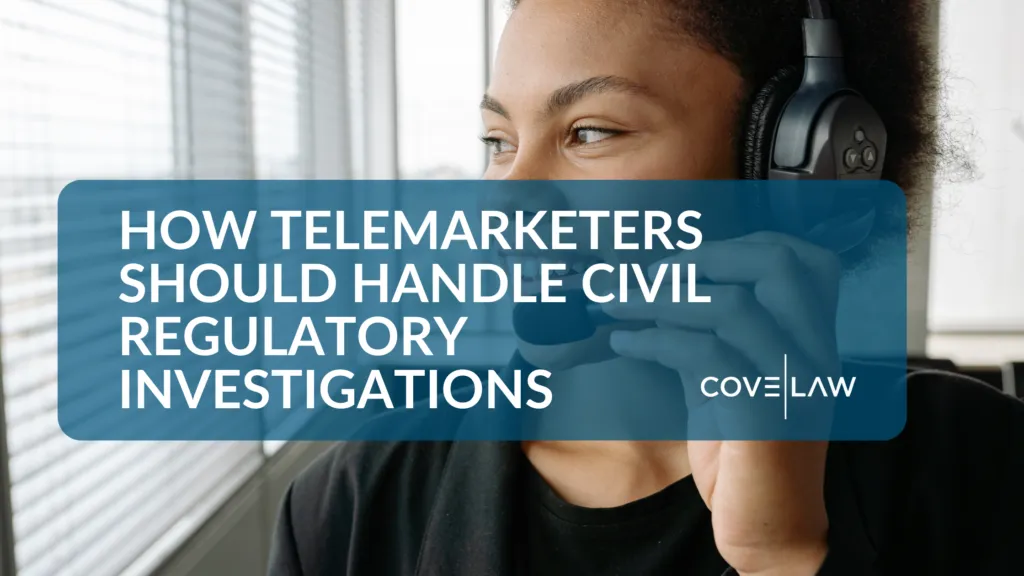Blogs
News & Updates

How Telemarketers Should Handle Civil Regulatory Investigations
If you’re in telemarketing, you already know that regulatory oversight is part of business. Agencies like the Federal Trade Commission (FTC), the Federal Communications Commission (FCC), and state attorneys general closely monitor compliance with laws like the Telephone Consumer Protection Act (TCPA) and Telemarketing Sales Rule (TSR).
Getting a letter or notice of investigation from one of these agencies can be stressful. How you respond, cooperate, and document your actions can significantly impact the outcome. A misstep in your response could turn a routine inquiry into a more significant legal issue. At the same time, a well-handled approach can help resolve the matter quickly. Understanding the investigation process and responding effectively is essential for protecting your business and ensuring compliance with evolving regulations.
Why Telemarketers Face Regulatory Investigations
Regulatory agencies investigate telemarketers for various reasons, including consumer complaints, competitor reports, random audits, and enforcement sweeps targeting specific industries or practices. Common triggers for an investigation include:
Allegations of Do-Not-Call (DNC) violations
Consent and opt-out disputes
Robocall concerns
Deceptive or misleading sales practices
Failure to comply with state laws
Remembering that an investigation doesn’t always mean you’ve done something wrong—it simply means regulators are reviewing a concern. How you respond can determine whether the issue is quickly resolved or becomes a prolonged legal battle.
How to Respond to a Civil Regulatory Investigation
1. Read the Inquiry Carefully and Identify the Scope
The first step in responding to a regulatory investigation is to carefully review the letter, subpoena, or notice you receive. It will usually outline:
The agency conducting the investigation
The alleged issue or violation
The specific documents, records, or responses being requested
Deadlines for compliance
Understanding precisely what is being asked of you is crucial. Legal counsel can help interpret the language if the request is unclear and advise on the next steps.
2. Do Not Ignore or Delay Your Response
Failing to respond to a regulatory inquiry can escalate the situation. Ignoring the complaint can lead to subpoenas, fines, or formal enforcement actions, even if you believe the complaint is without merit.
3. Gather and Review Relevant Documentation
Most investigations require copies of call records, consumer consent documentation, internal policies, or marketing scripts. Before submitting any documents, please review them for accuracy and consistency. If errors or gaps exist, be prepared to explain them.
4. Be Strategic in Your Response
When responding to an agency’s request, provide only the required information—no more, no less. Oversharing can open new areas of inquiry, while incomplete responses may be seen as non-cooperation.
5. Know Your Rights and When to Push Back
Just because an agency makes a request doesn’t mean it’s always valid or enforceable. Some investigations overreach or demand excessive records that are beyond legal requirements. If an inquiry seems unreasonable, you have the right to challenge or negotiate the scope of the request.
6. Plan for the Long Term
If the investigation results in further scrutiny, you may need to negotiate settlements or compliance agreements to resolve the issue. Proactively updating your internal compliance procedures can help demonstrate good faith and avoid repeat issues.
If you need legal guidance on how to respond, Cove Law, PA, can help. We work with telemarketers to develop strong compliance strategies and assist with regulatory matters. Contact us today to discuss your situation.
Disclaimer: The information you obtain at this site is not, nor is it intended to be, legal advice. You should consult an attorney for advice regarding your individual situation. We invite you to contact us and welcome your calls, letters, and electronic mail. Contacting us does not create an attorney-client relationship. Please do not send any confidential information to us until such time as an attorney-client relationship has been established.


